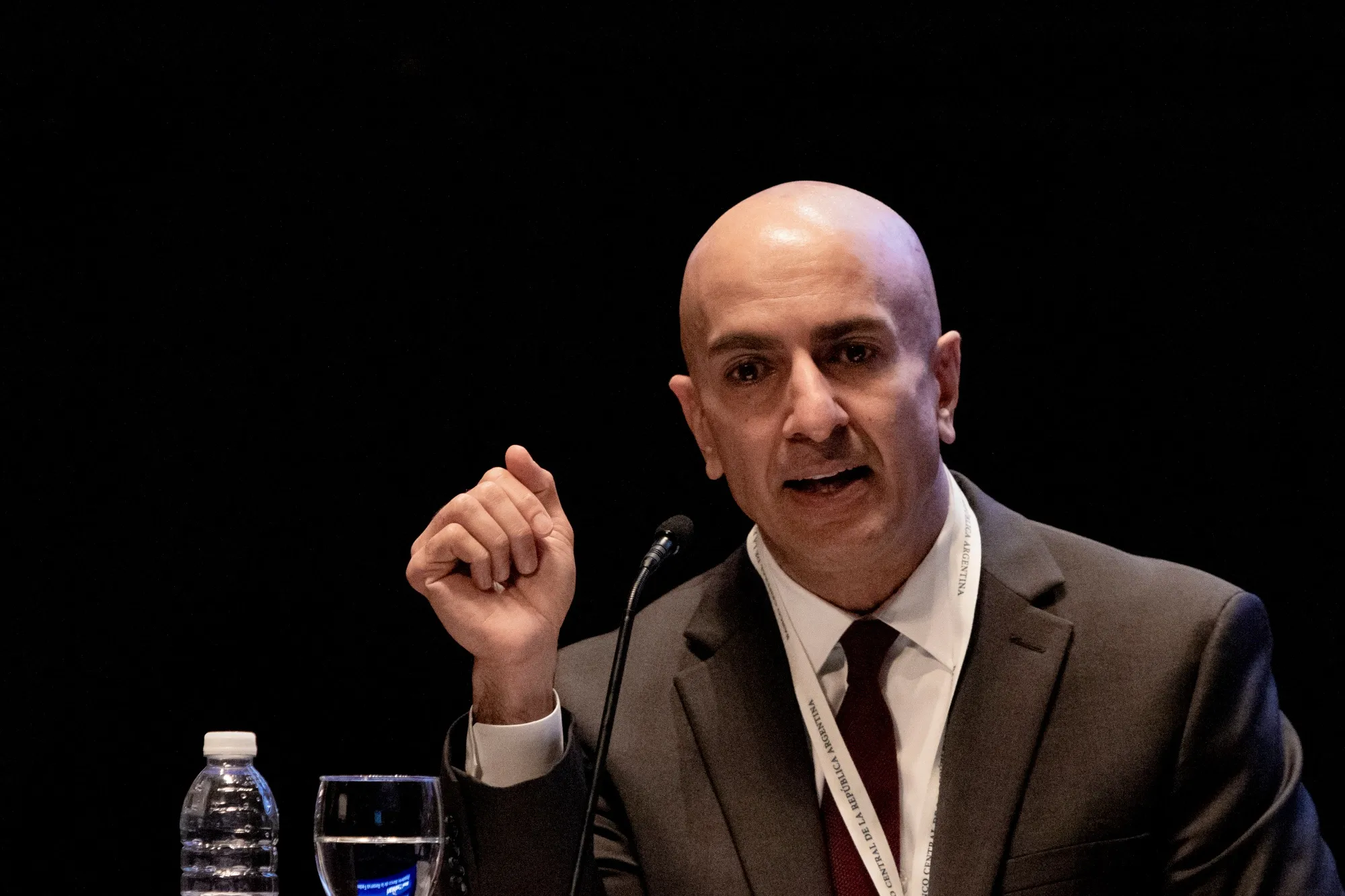Inflation Control Amid Tariffs: Kashkari Urges Caution


Inflation control amid tariffs is the main concern for Neel Kashkari, President of the Federal Reserve Bank of Minneapolis. As the U.S. faces growing discussions around trade tariffs and possible economic shifts, Kashkari warns that the Federal Reserve must stay focused on its core mission—keeping inflation low and stable.
In a recent interview and public remarks, Kashkari made it clear that even if tariffs are used to support domestic manufacturing or strengthen trade negotiations, the Fed must not lose sight of the bigger picture. Rising costs from tariffs could lead to inflation pressures, and controlling inflation remains essential for long-term economic health.
The Fed’s Balancing Act in a Shifting Economy
Kashkari’s comments come at a time when the U.S. economy is facing renewed debates over the use of tariffs. With both political and economic tensions rising between global trade partners, tariffs are being seen again as tools to shape foreign policy and protect certain industries.
But this creates a new challenge for the Federal Reserve. As tariffs increase the cost of imported goods, they also raise prices for consumers. If these price increases spread widely across the economy, they could push inflation above the Fed’s target level of 2%. That’s where Kashkari is sounding the alarm.
Inflation Control Amid Tariffs Is Crucial
Kashkari stressed that while tariffs may serve political or strategic purposes, the Fed’s role isn’t to evaluate those goals. Its job is to monitor inflation and ensure stable prices. If tariffs trigger higher inflation, the Fed may need to raise interest rates—even if the economy is otherwise showing signs of slowing.
“The main focus should remain inflation control amid tariffs and other policy changes,” Kashkari stated. “We can’t afford to ignore price pressures just because the cause is political or international in nature.”
Tariffs Could Challenge the Fed’s Inflation Goals
When tariffs are introduced, the first impact is often seen in higher prices for certain goods—especially those that rely heavily on international supply chains. Electronics, auto parts, and even food products could all become more expensive.
If these higher prices spread, consumer spending patterns may shift. People might spend less on discretionary items, and businesses could slow down investment if they see costs rising unpredictably.
This kind of uncertainty can make the Fed’s job more difficult. The central bank typically raises interest rates to cool inflation or lowers them to stimulate the economy. But when both inflation and economic slowdown occur at the same time—a scenario called “stagflation”—there are no easy answers.
Kashkari’s message is clear: better to stay ahead of inflation before it gets out of control.
Kashkari’s Track Record and His Cautious Tone
Known for being one of the more dovish members of the Fed—that is, someone typically in favor of lower interest rates—Kashkari’s recent shift toward inflation vigilance stands out.
In the past, he’s emphasized the importance of supporting job growth and not overreacting to short-term price changes. But in today’s climate, he seems more willing to support stronger moves if inflation starts rising due to tariffs.
This change reflects just how serious inflation threats are becoming in the eyes of central bankers.
How Inflation Control Impacts Ordinary Americans
At a personal level, inflation affects everyone. When prices rise faster than wages, people feel the squeeze in their daily lives. Groceries cost more, gas prices increase, and housing becomes harder to afford. Controlling inflation ensures that people can plan for the future, save money, and maintain a decent standard of living.
Kashkari’s comments are a reminder that inflation control amid tariffs is not just a macroeconomic issue. It has real consequences for workers, families, and small businesses across the country.
What Happens If Inflation Gets Out of Hand?
If the Fed fails to respond quickly enough to inflation pressures caused by tariffs, the economy could spiral. Here’s what that might look like:
- Rising Interest Rates: The Fed may need to raise rates quickly to bring inflation down, which could slow economic growth.
- Reduced Consumer Confidence: People may cut back on spending, especially if they feel their money isn’t going as far.
- Business Uncertainty: Companies may delay hiring or expansion if they’re unsure about future costs.
- Stock Market Volatility: Investors might panic if they believe inflation is outpacing the Fed’s ability to manage it.
To avoid these scenarios, Kashkari is urging a steady hand and clear focus.
The Role of the Fed Moving Forward
So what’s next for the Fed? Kashkari suggests that while it should remain data-driven, it must be ready to act if inflation expectations begin to rise. Monitoring wage growth, supply chain trends, and consumer prices will be critical.
The Fed has to avoid overreacting to temporary inflation, but it also must avoid being too slow. Striking that balance requires leadership that understands both the numbers and the broader impact on the economy.
Political Pressures and Public Misunderstanding
Part of Kashkari’s challenge is helping the public and politicians understand the Fed’s limited role. While tariffs are a tool used by elected officials, monetary policy is meant to operate independently of politics.
But in practice, the lines can get blurry. As tariffs unfold and prices shift, the public may look to the Fed for quick fixes. Kashkari is pushing back against that idea, stressing that the Fed must act responsibly, not reactively.
“The Fed can’t be swayed by political noise,” Kashkari noted. “We need to stick to our core mission—price stability and maximum employment.”
Key Takeaways from Kashkari’s Inflation Warning
- Inflation control amid tariffs is the top priority for the Fed right now.
- Tariffs may increase prices, putting pressure on consumers and businesses.
- The Fed must monitor inflation trends closely and be ready to act.
- While political debates continue, the Fed’s job is to stay focused and data-driven.
- Neel Kashkari, once a strong voice for low interest rates, is now more open to tightening policy if inflation rises.
The Bigger Economic Picture
The U.S. is entering a period of uncertainty. Global tensions, supply chain changes, and shifting trade policies are making it harder to predict economic outcomes. But one constant remains: if inflation spirals, the damage can be long-lasting.
By keeping inflation under control, the Fed can provide a stable foundation for future growth. That’s why Kashkari’s warning is so important. It’s not just about reacting to tariffs—it’s about staying vigilant and prepared.
Conclusion: Staying Focused on What Matters
As new tariffs unfold and political pressures rise, the Federal Reserve must remain grounded in its mission. Kashkari’s call to focus on inflation control amid tariffs is a reminder that short-term decisions can have long-term effects.
While politicians debate trade policies, the Fed has one clear job: keep prices stable, ensure people’s purchasing power remains strong, and protect the economy from inflation shocks. Kashkari’s words reflect that responsibility, and they serve as a timely reminder that even in a changing world, some principles must stay firm.
Read Next – China Tariff Increase Hits Eden Prairie Firm With $170K Bill
Recent Posts
Family Life USA Today: Values Challenges and Modern Trends
Family life USA reflects the heart of American culture but it has gone through major…
American History Simplified: Key Events and Lessons to Know
American history is filled with powerful stories of struggle, growth, freedom, and change. From the…
American Culture Explained Simply: Traditions Values and Life
American culture is one of the most diverse and influential cultures in the world. Shaped…
Stress Management Tips That Can Change Your Daily Life
Stress management is more important than ever in today’s fast-paced world. Whether it’s work pressure,…
Sleep Health in America: Why It Matters More Than Ever
Sleep health plays a major role in your physical and mental well-being but it's often…
Chronic Diseases in the USA: Causes, Prevention, and Solutions
Chronic diseases are long-lasting health conditions that often require ongoing medical attention and can limit…

